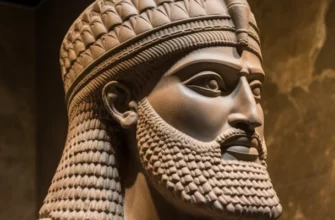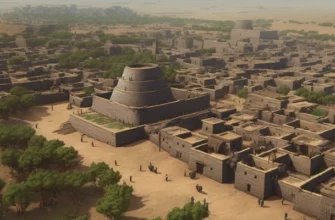The fall of Assyria and the Neo-Babylonian Empire are among the most significant events in the ancient history of Mesopotamia. Assyria fell due to internal conflicts and enemy attacks, while the Neo-Babylonian Empire fell due to its conquest by the Persian king Cyrus II. The fall of these empires led to changes in the political and cultural landscape of the region, which was reflected in the further development of the ancient East.
The predecessor of the Neo-Babylonian Empire – Assyria
Assyria was a state that existed in Mesopotamia from the 21st to the 7th centuries BC. As the predecessor of the Neo-Babylonian Empire, Assyria reached the peak of its development in the 7th century BC under the rule of King Ashurbanipal. However, due to internal conflicts and enemy attacks, Assyria was defeated and fell in 612 BC. Since then, its territory has been divided between Media, Lydia, and New Babylonia
Reasons for the fall of Assyria
The fall of Assyria was the result of several factors. First, the state became too large and complex to manage, which led to internal conflicts. Second, Assyria was constantly at war with neighboring states, which led to exhaustion and economic decline. Third, changes in natural conditions—in particular, the drying up of rivers—led to demographic changes and consequences for Assyria’s economy. All of this led to the weakness of the state and its defeat by its enemies.
The successor to Assyria—the Neo-Babylonian Empire
The Neo-Babylonian Empire was a state that existed in Mesopotamia from 626 to 539 BC. As the successor to Assyria, the Neo-Babylonian Empire took over the legacy of ancient Mesopotamian culture and reached the peak of its development during the reign of King Nebuchadnezzar II. The state is also known for its luxurious capitals – Babylon and Nineveh – and the construction of such monuments as the Babylonian ziggurat. However, the Neo-Babylonian Empire was conquered by the Persian king Cyrus II in 539 BC and lost its independence.
Reasons for the success of the Neo-Babylonian Empire
The Neo-Babylonian Empire achieved success due to several factors. First, King Nebuchadnezzar II pursued an active foreign policy, conquering new territories and ensuring the expansion of the empire’s power. Second, he also engaged in active construction, which led to an increase in prestige and the development of cities. Third, the renowned culture and science of the Neo-Babylonian Empire proved very attractive to neighboring peoples, which contributed to the development of trade and the growth of the state. Finally, the Neo-Babylonian Empire’s reliable army ensured the protection of its territory and enabled it to wage successful wars.
The fall of the Neo-Babylonian Empire
The fall of the Neo-Babylonian Empire came as a result of the invasion of the Persian king Cyrus II in 539 BC. The Persian army successfully captured the capital of the empire, Babylon, after which the Neo-Babylonian Empire was subjugated by Persia. Cyrus II recognized the local rulers but imposed certain restrictions on them, particularly in the areas of foreign policy and the army. The conquest of the Neo-Babylonian Empire by the Persian armies played an important role in the formation of the Persian Empire, which became one of the largest states of that time.
Consequences of the fall of both states
The fall of the Neo-Babylonian Empire and Assyria had significant consequences for the political, cultural, and social life of the region. In particular, it led to changes in the world map, the destruction of cities and infrastructure, and the disruption of trade relations and economic development. The fall of both states also played an important role in the formation of new states, such as the Persian Empire and the Median Empire. In addition, it led to the spread of new cultures and ideas that influenced the further development of the world. The successors of Assyria and the Neo-Babylonian Empire also became important players in the political and cultural life of the region, influencing the further course of history.
Conclusions
The fall of Assyria and the Neo-Babylonian Empire were important events in the history of the Middle East and world history as a whole. These states had a significant impact on the political and cultural life of their era, and their demise led to a change in the course of history and the creation of new states. The causes and consequences of the fall of these states were complex and varied, but they became important factors in shaping the modern world. Understanding these events is important for understanding the history of the Middle East and the interrelationships between cultures and states as a whole.








